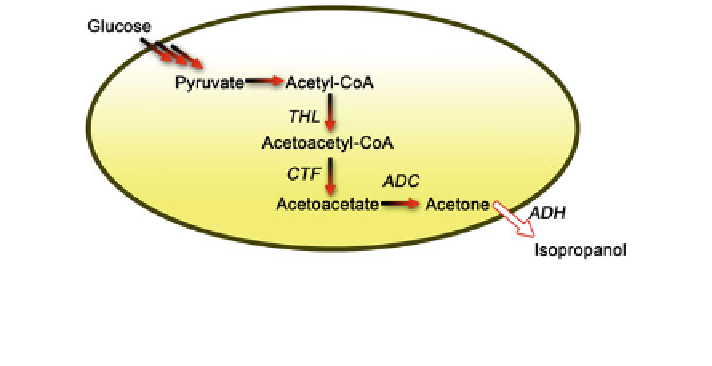Biomedical Engineering Reference
In-Depth Information
Fig. 3 Synthetic pathway and key enzymes for isopropanol production. The pathway from
glucose to acetone is a natural one. When primary-secondary alcohol dehydrogenase (ADH) was
introduced, the synthetic pathway for isopropanol production was established. THL thiolase, CTF
coenzyme A transferase, ADC acetoacetate decarboxylase, CoA coenzyme A
this experiment, evolutionary engineering has been proven to be effective for
improving branched-chain-alcohol tolerance of host strains.
The second strategy for improving alcohol tolerance of microorganisms is by
rational design and metabolic engineering. Liao's group [
41
] used information
from genomic analysis of an evolutionary strain with improved tolerance to iso-
butanol and reconstructed one strain with improved tolerance to isobutanol.
Improving alcohol tolerance of microorganisms by rational design is based on
sufficient information provided by omics analysis, and this is going to be one
routine approach for improving industrial strains with the progress in sequencing
technology.
4.3 Microbial Production of BCHAs
Many species of Clostridium have been investigated for isopropanol production,
but the maximum concentration of isopropanol produced is no more than 30 mM
[
45
]. Limited knowledge about metabolic regulation of the strains and the diffi-
culty of gene manipulation have hindered further improvements in isopropanol
production. However, many clostridia could produce a high amount of acetone,
and Bermejo et al. [
46
] produced acetone in E. coli by introducing three genes
from C. acetobutylicum ATCC 824 [THL, CTF, and ADC encoding acetyl coen-
zyme A (CoA) acetyltransferase, acetoacetyl-CoA transferase, and acetoacetate
decarboxylase, respectively]. This engineered E. coli strain produced almost the
same level of acetone as C. acetobutylicum ATCC 824 does.
Therefore, biosynthesis of isopropanol (Fig.
3
) can be engineered into host
strains by introducing the pathway from Clostridium beijerinckii or other clos-
tridia, which produces isopropanol from acetyl-CoA via acetone [
37
]. First, an
acetyl-CoA acetyltransferase condenses two molecules of acetyl-CoA, which is a

Search WWH ::

Custom Search